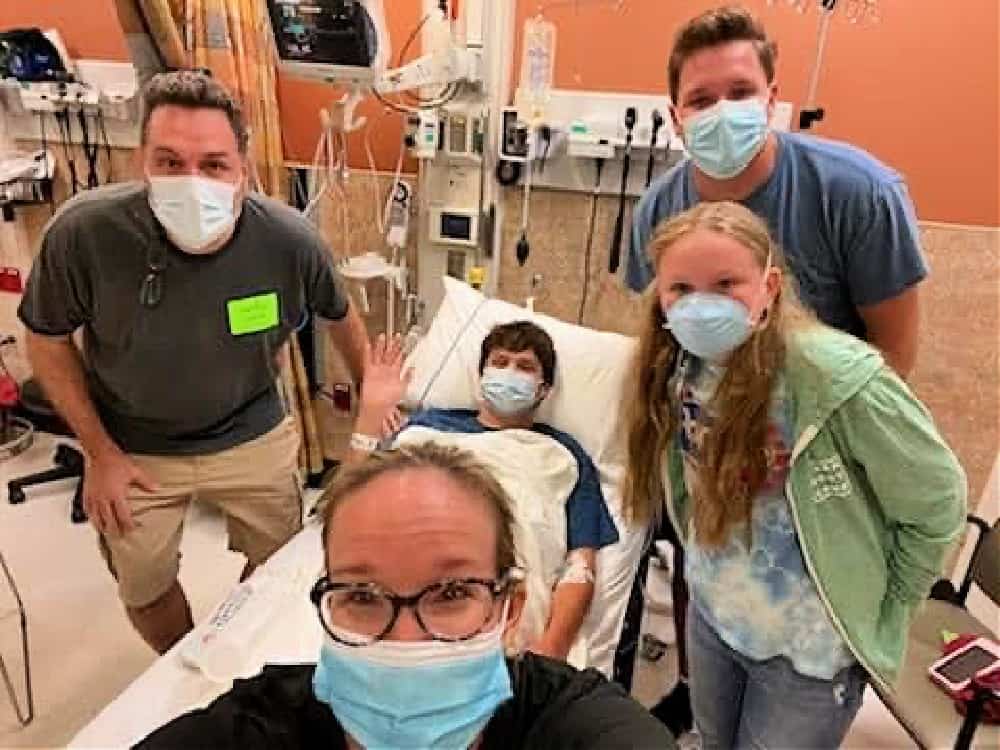
By Stacy Leicht
As a middle school teacher of reading, writing, poetry, and grammar, I was surrounded by teens all day, and I thought I had a firm grasp on how to parent a middle schooler.
Then, I had one, and he sometimes caught me unprepared.
The day my son came home from school upset and angry, my first battle was getting him to open up and tell me what happened. We sat at the kitchen table, munching cheddar popcorn, as I asked questions. Finally, I landed on one that pried open the door.
“Is someone mistreating you or being mean to you?”
He lowered his head.
I asked the same question again, adding, “It’s important that you feel safe at school.”
He nodded. “I don’t want anyone to get into trouble.”
I could help my son with his homework and navigate the school administration with ease. But this? I couldn’t draw on my professional experience to teach my kid how to deal with bullies. I could only share my own history and hard-earned wisdom and hope that was enough.
“When I was your age, someone bullied me, too, and I had to learn how to deal with it. I want to help you learn how to deal with people who aren’t being nice to you. ”
He raised his freckled face and turned his blue-eyed gaze on me. Then he told me his schoolmates were bullying him because of his red hair.
How dare other children make fun of my perfect boy!
I told him, “Tomorrow, you’ll just go back to school and ignore those bullies. Eventually, they’ll stop being mean to you.”
It was standard advice for teaching resilience, the same advice given to me all those years ago, and I secretly prayed it was still a strategy that worked. I hoped I wouldn’t have to escalate things by calling the school to talk to the teacher or the principal. My son didn’t want more attention brought to the situation. He just wanted to be left alone.
The following day, the bus pulled up as I waited by the front door, my breathing tight. He climbed down the bus steps slowly, head hung low, shoulders slumped. His day had gone poorly. My stomach fell, and my heart hurt watching my son drag his feet to our house.
“I don’t want to talk about it!” he said, then went straight to his room to lay on his bed and watch television.
How to Respond to Middle School Bullying
Ignoring the bullies didn’t work for him. As I began cooking dinner, I searched for another approach. I started listing my son’s best qualities that other kids his age would appreciate. The first ones that popped into my mind were his sense of humor and quick wit. I wondered if he could use them to combat the bully somehow.
The next day, I kept him home from school so he and I could figure out how to deal with bullies using his most remarkable skills. I told him we’d practice with role-play.
“Pretend I’m you and that you’re the bully. Say what the bully says to you. I’m going to respond with a funny answer.”
My son looked at me and said, “That’s not going to work.”
“Try it anyway,” I prodded.
He pointed at my hair. “Hey, your head’s on fire!”
“Great, I was about to make s’mores. Get the marshmallows and graham crackers,” I answered.
We both laughed so hard.
We practiced several more times throughout the day so that he could respond quickly when a bully said ugly remarks about his hair.
The next morning, he got on the school bus, and my stomach ached as it pulled away. All day, I worried the bullies would be mean to my son, and I hoped our role-play would help him. I sent him these positive thoughts: Remember what we practiced. You’re funny. Use your humor to disarm them.
I sat on the couch with a cup of hot tea in one hand, looking at my son’s newest school picture. My son was kind-hearted and clever. He had so many qualities that made him a great friend. Couldn’t these bullies see that? Why were they so cruel?
I thought back to when I was bullied in seventh grade for having a “ski slope nose” and how terrible it felt to be made fun of for something that was part of me. My nose was long and pointed and it used to bother me, especially then. Now my nose has become something I appreciate because it’s a physical trait I share with many in my family.
At the end of the day, the school bus turned the corner, then stopped near our house. When the doors opened this time, my son bounded off the bus and then ran to me, smiling.
“How was your day?” I asked him.
“Perfect,” he replied. “Those bullies made fun of me.”
I wasn’t expecting that response.
“Tell me what happened,” I prompted.
“Well, a kid who always makes fun of my hair walked up to me. I knew he was getting ready to say something mean, so I tried to remember the funny things we practiced at home yesterday.”
“Good, good!” I said joyfully. “And then what happened?”
“When the bully said, ‘Did you know that people with red hair look like they are on fire?’ I told him, ‘That’s because we’re hot!’”
I laughed. My son laughed.
Then I asked, “What did the bully do?”
“Well, I think, at first, my funny comeback surprised him. Then, he laughed.”
“So, it worked?”
“Yep. He just walked away after I made him laugh.”
I was so happy for my son. I reached out and gave him a hug. “Way to go! You used your sense of humor to deflect his negative words.”
Our role-playing experiment worked. My son survived middle school and beyond by using his sense of humor to deflect hurtful comments. Eventually, he grew into an adult who learned to embrace his strawberry blonde hair and freckles, making my mama’s heart very happy!

 PARENTING TIPS
PARENTING TIPS PREGNANCY
PREGNANCY BABY CARE
BABY CARE TODDLERS
TODDLERS TEENS
TEENS HEALTH CARE
HEALTH CARE ACTIVITIES & CRAFTS
ACTIVITIES & CRAFTS

